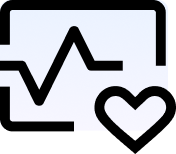Pregnancy needs a hormone called progesterone to grow normally. The first pill you take blocks your body’s own progesterone, stopping the pregnancy from growing.
If you were given or told to take medicine for nausea or cramping, you’ll take that 30 minutes before you take the second pill. Then you’ll take the second medicine, 24-48 hours later. There are four misoprostol pills that you’ll take in one of the following ways:
Buccal (in your mouth between your cheek and gums)
Taken 24 – 48 hours after taking mifepristone.
You will put the four misoprostol pills between your cheek and gum, two on each side of your mouth. You will leave them in place for 30 minutes. After 30 minutes, you’ll swallow what’s left of the pills with water.
Vaginal
Inserted 24 – 48 hours after taking mifepristone.
While lying down you will put four misoprostol pills in your vagina and push them in far enough so they don’t fall out. You will stay lying down for 30 minutes while they dissolve. After 30 minutes you’ll be able to get up and move around. If any pieces come out of your vagina you won’t need to put them back in.

















 (US)
(US)